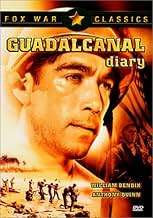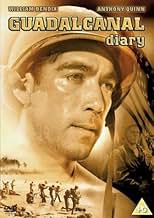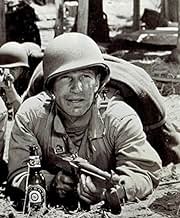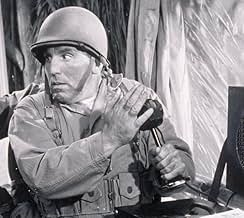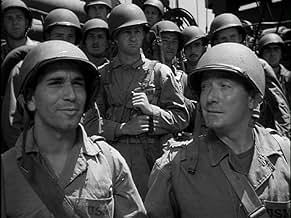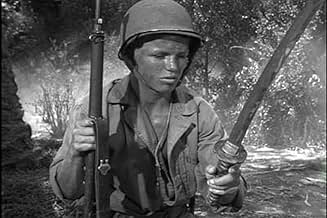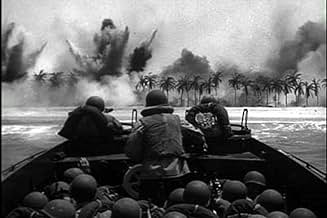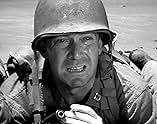IMDb RATING
6.6/10
2.3K
YOUR RATING
The story of a large U.S. Marines invasion task force bound for Guadalcanal in the Solomon Islands in 1942.The story of a large U.S. Marines invasion task force bound for Guadalcanal in the Solomon Islands in 1942.The story of a large U.S. Marines invasion task force bound for Guadalcanal in the Solomon Islands in 1942.
Eddie Acuff
- Pvt. Tex Mcllvoy
- (uncredited)
Warren Ashe
- Col. Morton
- (uncredited)
Martin Black
- Marine
- (uncredited)
Marion Carl
- Marine Pilot
- (uncredited)
Harry Carter
- Dispatch Officer
- (uncredited)
Tom Dawson
- Captain
- (uncredited)
Storyline
Did you know
- TriviaMarine Corps Capt. Marion Carl, a multi-ace (18.5 air victories), makes an appearance as a Marine Corps pilot. Capt. Carl wears his baseball cap with the bill pointed skyward and makes the comment, "Don't look now, fellas, but a truck of gas just came on the field." Capt. Carl was a survivor of the Battle of Midway and the air campaign for Guadalcanal in 1942. He was awarded 2 Navy Crosses for his actions at Midway and Guadalcanal. Sadly, on June 28, 1998, he was murdered in his Oregon home by a home intruder.
- GoofsWhen Japanese snipers hid in the tops of trees, they tied themselves into their positions. They did not fall out of the trees when shot.
- Quotes
Cpl. Aloysius T. 'Taxi' Potts: [In dugout waiting out a heavy artillery barrage] I don't mind the one with my name on it. It's the one that says, 'To whom it may concern' that I don't like.
[after the barrage increases]
Cpl. Aloysius T. 'Taxi' Potts: They're throwing everything at us but the kitchen stove.
Gunnery Sgt. Hook Malone: [after an even louder explosion] That's the stove now!
- Crazy creditsThe film's opening prologue in the preface of a book states: A new chapter in the history of America by a correspondent who landed on Guadalcanal with the first detachment of United States Marines.
- ConnectionsEdited into All This and World War II (1976)
- SoundtracksMarine Hymn
(uncredited)
Music by Jacques Offenbach from "Geneviève de Brabant"
Played during the opening credits and occasionally in the score
Featured review
This is one of the better (and most topical) of Hollywood’s wartime efforts, but which seems to have been largely overlooked among the surplus of such films – possibly because it was helmed by journeyman director Seiler.
Still, the handling is entirely professional and the film makes the most of a good script by Lamar Trotti – peopled with believable characters ably portrayed by a fine cast (Preston Foster, Lloyd Nolan, Richard Conte, Anthony Quinn, Richard Jaeckel). The requisite comic relief provided by William Bendix and Lionel Stander is slightly overstated…but, then, Bendix delivers the film’s most moving speech towards the end.
The film – unavoidably jingoistic but, at the same time, realistic i.e. thankfully free of gung-ho heroics – balances taut action sequences (culminating in the so-called “Great Offensive”) with a handful of undeniably powerful, lingering images (particularly the line-up of dead U.S. marines ambushed on a beach by the devious Japanese forces). I’ll be following this with Cornel Wilde’s well-regarded BEACH RED (1967), which also deals with WWII combat in the Pacific; besides, I also own – but have yet to watch – the R2 DVD of Lewis Milestone’s contemporaneous THE PURPLE HEART (1944), which tackles similar events from a unique perspective.
Still, the handling is entirely professional and the film makes the most of a good script by Lamar Trotti – peopled with believable characters ably portrayed by a fine cast (Preston Foster, Lloyd Nolan, Richard Conte, Anthony Quinn, Richard Jaeckel). The requisite comic relief provided by William Bendix and Lionel Stander is slightly overstated…but, then, Bendix delivers the film’s most moving speech towards the end.
The film – unavoidably jingoistic but, at the same time, realistic i.e. thankfully free of gung-ho heroics – balances taut action sequences (culminating in the so-called “Great Offensive”) with a handful of undeniably powerful, lingering images (particularly the line-up of dead U.S. marines ambushed on a beach by the devious Japanese forces). I’ll be following this with Cornel Wilde’s well-regarded BEACH RED (1967), which also deals with WWII combat in the Pacific; besides, I also own – but have yet to watch – the R2 DVD of Lewis Milestone’s contemporaneous THE PURPLE HEART (1944), which tackles similar events from a unique perspective.
- Bunuel1976
- Jul 17, 2007
- Permalink
- How long is Guadalcanal Diary?Powered by Alexa
Details
- Release date
- Country of origin
- Language
- Also known as
- Richard Tregaskis' Guadalcanal Diary
- Filming locations
- Production company
- See more company credits at IMDbPro
- Runtime1 hour 33 minutes
- Color
- Aspect ratio
- 1.37 : 1
Contribute to this page
Suggest an edit or add missing content



